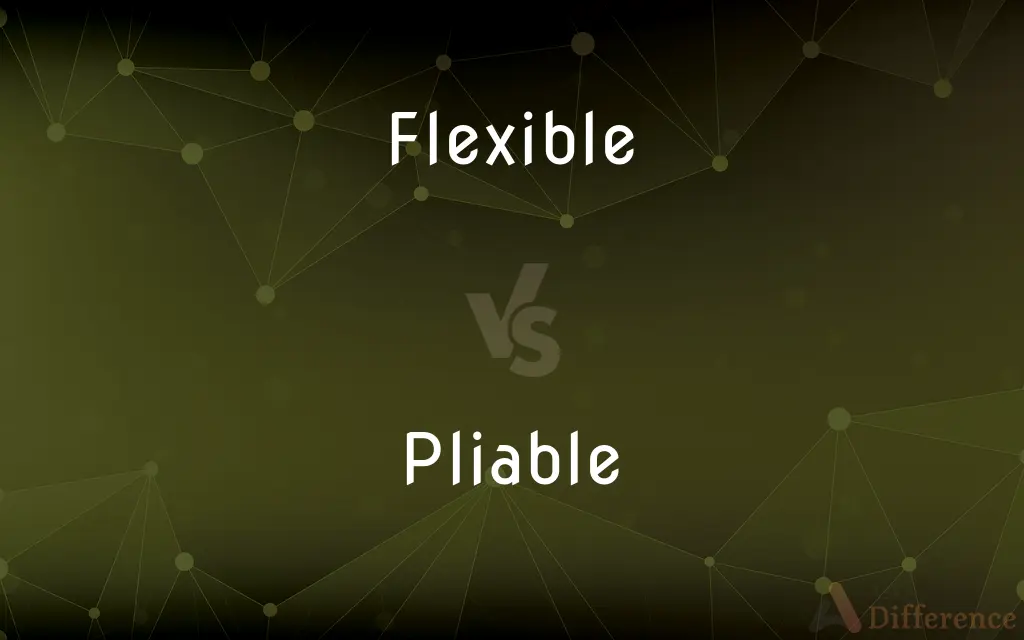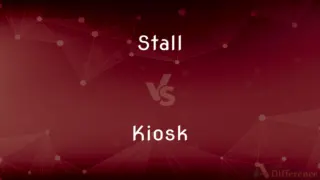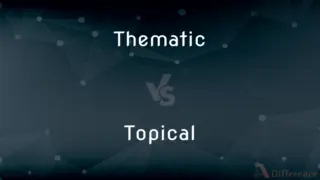Flexible vs. Pliable — What's the Difference?
Edited by Tayyaba Rehman — By Urooj Arif — Updated on March 28, 2024
"Flexible" describes the ability to bend easily without breaking, often used metaphorically for adaptability, while "pliable" specifically refers to being easily bent or shaped, highlighting physical malleability.

Difference Between Flexible and Pliable
Table of Contents
ADVERTISEMENT
Key Differences
"Flexible" is a term widely used to describe materials, objects, or even concepts that can adapt or bend without breaking, indicating resilience and versatility. It's often applied in various contexts, from physical properties of materials to metaphorical descriptions of thinking or planning. For instance, a flexible work schedule allows for adjustments based on personal needs, emphasizing adaptability. On the other hand, "pliable" is more narrowly focused on the physical quality of being easily bent, shaped, or molded. Pliable materials, like clay or soft metals, can be manipulated into different forms with ease, underlining their physical malleability and susceptibility to influence.
In the realm of materials science, "flexible" materials include those that can endure bending and flexing under force without permanent deformation or breaking, such as certain plastics or metals used in engineering and design. These materials are prized for their durability and versatility in various applications. In contrast, "pliable" materials might not possess the same level of durability but are valued for their ease of manipulation, making them ideal for crafts, sculpture, and certain manufacturing processes where shapeability is key.
When discussing personal qualities or skills, being "flexible" implies an ability to adjust one’s approach or thinking to new situations, challenges, or information. It's a trait highly regarded in fast-paced or ever-changing environments. Conversely, although "pliable" can be used to describe a person, it often carries a more negative connotation, suggesting a lack of firmness or too easily influenced or controlled by others, lacking in resilience or personal conviction.
In technology and innovation, "flexible" often describes systems or solutions that offer versatility and adaptability, such as flexible electronics that can bend without losing functionality. This flexibility opens up new possibilities for wearable tech and more. "Pliable," however, is less commonly used in this context but could describe the specific physical properties of materials that make such flexible technologies possible.
Both "flexible" and "pliable" play important roles in their respective contexts, but the key difference lies in their scope of application and connotation. "Flexible" is broader, covering both physical and metaphorical adaptability, while "pliable" focuses on the ease of physical manipulation, shaping, or bending.
ADVERTISEMENT
Comparison Chart
Definition
Capable of bending easily without breaking; adaptable.
Easily bent, shaped, or influenced; malleable.
Contexts
Used both physically and metaphorically.
Primarily physical, with less frequent metaphorical use.
Connotations
Positive, suggesting resilience and adaptability.
Neutral to slightly negative, suggesting susceptibility.
Applications
Materials science, work environments, personal skills.
Crafts, materials science, sometimes personal traits.
Durability
Implies resilience and the ability to withstand stress.
Focuses on ease of manipulation rather than durability.
Compare with Definitions
Flexible
Refers to adaptability and openness to change.
She appreciated the flexible hours that allowed her to balance work and family.
Pliable
Easily bent or adjusted; easily influenced or shaped.
The pliable wire was shaped into a beautiful sculpture.
Flexible
Able to bend without breaking; adaptable to change.
The flexible silicone baking molds can be twisted without damage.
Pliable
Can imply a lack of strength or conviction.
His pliable nature led others to frequently override his decisions.
Flexible
Valued for showing versatility and resilience.
His flexible mindset was key in managing the rapidly changing project requirements.
Pliable
Ideal for items that require molding.
Artists value pliable clay for its ease of manipulation into various forms.
Flexible
Describes devices or systems that adapt to various conditions.
The development of flexible screens has revolutionized smartphone design.
Pliable
Stresses ease of bending or shaping.
Pliable materials are essential for certain artistic and industrial applications.
Flexible
Materials that return to their original shape after bending.
Engineers prefer flexible materials for parts that undergo frequent flexing.
Pliable
More focused on physical characteristics than adaptability.
Pliable compounds are sought after for molding and shaping in manufacturing.
Flexible
Capable of bending easily without breaking
Flexible rubber seals
Pliable
Easily bent or shaped.
Flexible
Capable of being bent or flexed; pliable
A flexible hose.
Pliable
Capable of being changed or adjusted to meet particular or varied needs
A pliable policy.
Flexible
Readily bending or twisting the body without injury
You can play soccer much better if you're flexible.
Pliable
Easily influenced, persuaded, or controlled
Replaced the complainer with a more pliable subordinate.
Flexible
Able to change to cope with variable circumstances
"a flexible and quietly competent administrator" (Jerome Karabel).
Pliable
Soft, flexible, easily bent, formed, shaped, or molded.
You will find the clay perfectly pliable as long as it stays moist.
Flexible
Capable of being changed or adjusted to meet particular or varied needs
A job with flexible hours.
A flexible definition of normality.
Pliable
Easily persuaded; yielding to influence.
Flexible
Capable of being flexed or bent without breaking; able to be turned or twisted without breaking.
Pliable
Capable of being plied, turned, or bent; easy to be bent; flexible; pliant; supple; limber; yielding; as, willow is a pliable plant.
Flexible
Willing or prone to give way to the influence of others; not invincibly rigid or obstinate.
Pliable
Flexible in disposition; readily yielding to influence, arguments, persuasion, or discipline; easy to be persuaded; - sometimes in a bad sense; as, a pliable youth.
Flexible
Capable or being adapted or molded in some way.
A flexible language
Pliable
Susceptible to being led or directed;
Fictile masses of people ripe for propaganda
Flexible
Something that is flexible.
Pliable
Able to adjust readily to different conditions;
An adaptable person
A flexible personality
An elastic clause in a contract
Flexible
Capable of being flexed or bent; admitting of being turned, bowed, or twisted, without breaking; pliable; yielding to pressure; not stiff or brittle.
When the splitting windMakes flexible the knees of knotted oaks.
Pliable
Capable of being bent or flexed or twisted without breaking;
A flexible wire
A pliant young tree
Flexible
Willing or ready to yield to the influence of others; not invincibly rigid or obstinate; tractable; manageable; ductile; easy and compliant; wavering.
Phocion was a man of great severity, and no ways flexible to the will of the people.
Women are soft, mild, pitiful, and flexible.
Pliable
Capable of being shaped or bent or drawn out;
Ductile copper
Malleable metals such as gold
They soaked the leather to made it pliable
Pliant molten glass
Made of highly tensile steel alloy
Flexible
Capable or being adapted or molded; plastic,; as, a flexible language.
This was a principle more flexible to their purpose.
Flexible
Extended meanings; capable of change;
A flexible character
Flexible schedules
Flexible
Able to flex; able to bend easily;
Slim flexible birches
Flexible
Able to adjust readily to different conditions;
An adaptable person
A flexible personality
An elastic clause in a contract
Flexible
Bending and snapping back readily without breaking
Flexible
Making or willing to make concessions;
Loneliness tore through him...whenever he thought of...even the compromising Louis du Tillet
Common Curiosities
How is "flexible" used in the context of work or technology?
In work, it refers to adaptability and willingness to accommodate changes, while in technology, it describes innovations that can bend or adapt without losing functionality.
Is "flexible" always a positive trait?
Generally, yes, especially when referring to adaptability and resilience in facing change or challenges.
Is the flexibility of a material directly related to its strength?
Not necessarily; materials can be flexible without being strong, and vice versa. Flexibility relates to the material's ability to bend, while strength refers to its ability to withstand force without breaking.
What does it mean when a material is described as "flexible"?
It means the material can bend easily without breaking, often returning to its original shape, and is adaptable in various applications.
How do flexibility and pliability affect product design?
Products designed with flexibility and pliability in mind can offer more durability, adaptability, and innovative uses, particularly in wearable technology and consumer goods.
How does being flexible contribute to personal and professional growth?
Flexibility allows individuals to adapt to new challenges, learn from different situations, and be more open to change, contributing to personal development and professional success.
Why might pliability be valued in certain industries or crafts?
In industries like sculpture or manufacturing, pliability allows for creative expression and the ability to shape materials into intricate designs or practical products.
What role does flexibility play in leadership?
Flexibility in leadership involves adapting to changing circumstances, being open to new ideas, and effectively managing diverse teams, which is crucial for successful leadership.
How do cultural perceptions of flexibility and pliability differ?
Cultural perceptions can vary; flexibility is generally seen as positive, indicating adaptability, while pliability may be viewed negatively, suggesting a lack of individuality or strength.
Can a person be described as "pliable"?
Yes, but it may suggest that the person is easily influenced or lacks firmness, which can carry a negative connotation.
What are examples of pliable materials?
Clay, soft metals, and certain plastics are examples of materials that are easily shaped or molded.
Can something be both flexible and pliable?
Yes, an object or material can be both, if it can easily bend without breaking and is also easily shaped or influenced.
What makes "pliable" less desirable than "flexible" in certain contexts?
The emphasis on being easily shaped or influenced can imply a lack of durability or firmness, which might be less desirable in contexts valuing strength and resilience.
Can a work environment be too flexible?
Yes, an overly flexible work environment might lack structure, leading to confusion, inefficiencies, or a lack of accountability.
How might future technologies push the boundaries of flexibility and pliability?
Future technologies may develop materials and devices that exhibit extreme flexibility and pliability, enabling innovations like more advanced wearable devices, flexible electronics, and adaptable materials for various applications.
Share Your Discovery

Previous Comparison
Stall vs. Kiosk
Next Comparison
Thematic vs. TopicalAuthor Spotlight
Written by
Urooj ArifUrooj is a skilled content writer at Ask Difference, known for her exceptional ability to simplify complex topics into engaging and informative content. With a passion for research and a flair for clear, concise writing, she consistently delivers articles that resonate with our diverse audience.
Edited by
Tayyaba RehmanTayyaba Rehman is a distinguished writer, currently serving as a primary contributor to askdifference.com. As a researcher in semantics and etymology, Tayyaba's passion for the complexity of languages and their distinctions has found a perfect home on the platform. Tayyaba delves into the intricacies of language, distinguishing between commonly confused words and phrases, thereby providing clarity for readers worldwide.
















































